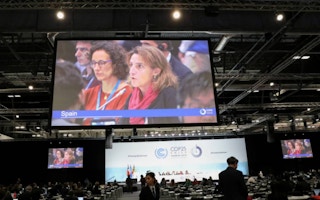UN climate negotiations will take place online during three weeks in June, with the aim of pushing ahead on work vital for the success of the COP26 summit planned for November, assuaging fears of further delays in a “crucial year” for climate action.
A committee of government officials from different regions on Thursday night decided the June talks would proceed virtually, in line with a letter sent this week by COP26 host Britain that said “we cannot afford to put formal work on hold”.
Due to the impossibility of bringing delegates together in person because of the Covid-19 pandemic, the May 31-June 17 talks will be held online but formal decisions will not be made.
The UN climate change secretariat (UNFCCC) said in a statement it would provide support to “ensure the full and effective participation, in a fair and inclusive manner” of governments and civil society groups.
That includes helping with logistical and internet connectivity needs for delegates as required, it added.
The interim talks, which usually happen over two weeks in Germany, have been extended for an additional week, as accommodating different time zones will mean shorter work days.
In response to concerns raised by some developing countries, including African nations, that the virtual format could disadvantage their participation, the discussions during the June meeting will be classified as “informal”.
“Decisions will only be adopted at the next formal meeting in person,” the UNFCCC statement said.
It remains unclear when a face-to-face meeting will be possible, but it could take place in September, October or just before the November COP if circumstances allow, a UNFCCC spokesman told the Thomson Reuters Foundation.
In a tweet on Friday, the chairman of the group of 46 least-developed countries in the negotiations said the aim must be to “maximise progress and minimise delay” on climate action but the “voices of the vulnerable must be heard”.
“
Rising to the occasion requires urgent action now, including in upcoming negotiations, recognising time is not on our side.
Alok Sharma, COP26 president
‘Time not on our side’
While some, including Swedish teen activist Greta Thunberg, have called for the COP26 summit itself to be postponed due to coronavirus concerns and unequal access to vaccines, this is not on the cards for the time being, UN and UK officials said.
The conference was already delayed for a year by the pandemic.
In this week’s letter, the UK’s COP26 president, Alok Sharma, said 2021 was “a crucial year for people and planet” as the world faces the interrelated challenges of a global health pandemic, accelerating biodiversity loss and escalating global warming and associated impacts.
“Rising to the occasion requires urgent action now, including in upcoming negotiations, recognising time is not on our side,” he wrote to governments.
Both he and U.S. climate envoy John Kerry have referred to Glasgow’s COP26 conference as the “last best chance” of keeping global warming to 1.5 degrees Celsius, the lowest goal in the 2015 Paris Agreement.
Scientists say if that limit is passed the world could see accelerating extreme weather and nature losses, growing hunger and migration, and other serious threats.
The COP26 talks are tasked with working out how much further emissions must be cut to keep 1.5C in sight, finalising global carbon market rules and galvanising more climate finance to help poorer nations adopt clean energy and adapt to a warming planet.
Currently work is ongoing to explore options for conducting the COP26 talks partially or fully online, if it is impossible for some delegates from regions such as Latin America or the Pacific to attend due to travel and vaccination issues, the UNFCCC spokesman said.
A decision on the format of the COP26 talks is unlikely to be made before the late summer or September.
Richard Klein, a senior research fellow with the Stockholm Environment Institute, who is undertaking a project on how online technology can help make climate negotiations more inclusive, transparent and effective, said the pandemic had forced the issue onto the political agenda.
Even after physical meetings can once again be held easily, there will likely be a move to slim down UN climate conferences, which can attract upwards of 20,000 people, sometimes with little concrete progress to show, he added.
“There is more appetite now to look at alternative options that also don’t have such an environmental footprint,” Klein told the Thomson Reuters Foundation.
“I hope that the event in June will pave the way to a longer-term vision about what will happen to the UNFCCC process.”
This story was published with permission from Thomson Reuters Foundation, the charitable arm of Thomson Reuters, that covers humanitarian news, climate change, resilience, women’s rights, trafficking and property rights. Visit http://news.trust.org/climate.












